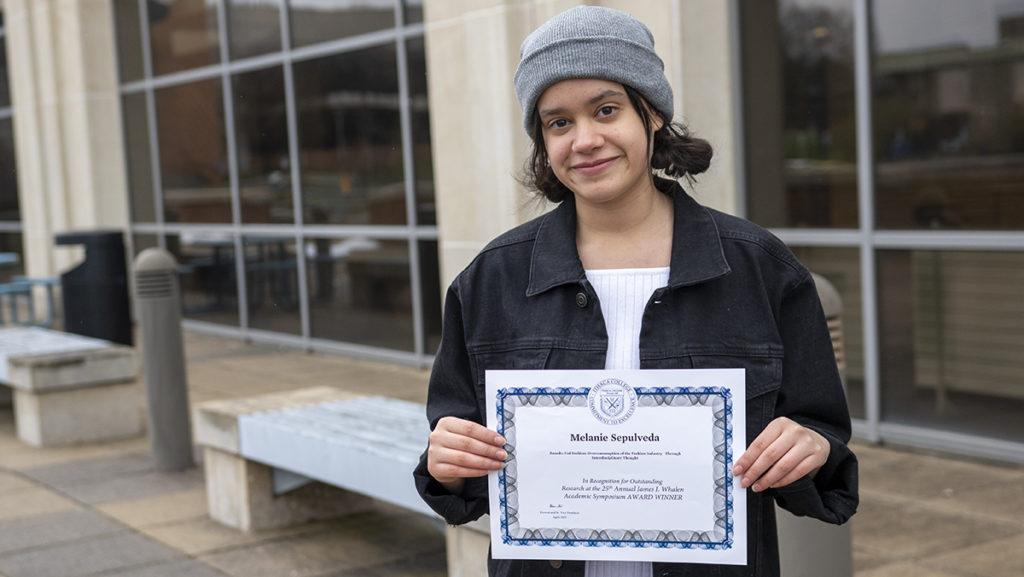On the first day of the Whalen Symposium, junior Melanie Sepulveda-Rosado presented her research paper “Fad Fashion: Overconsumption of the Fashion Industry Through Interdisciplinary Thought.”
From April 11 to 12, Ithaca College hosted the annual Whalen Symposium, which honors the college’s former president James J. Whalen by allowing students to present their research in a professional setting and win awards. This year, students from the School of Humanities and Science presented their research April 11, while students from the Schools of Business, Health Science & Human Performance, Music and the Roy H. Park School of Communications presented April 12. On April 11, Sepulveda-Rosado won Best Oral Presentation for her project and shook hands with President La Jerne Cornish and Melanie Stein, provost and senior vice president of Academic Affairs.
The paper, which Sepulveda-Rosado wrote independent of her coursework, examines the wastefulness and corruption that is endemic in the fashion industry. Through different disciplines like economics, natural science and marketing science, the paper looks at how fashion culture has created one of the most profitable industries in the world.
News editor Elijah de Castro spoke to Sepulveda-Rosado about the inspiration behind her project, the content of her paper, and what she plans to do with the project in the future.
This interview has been edited for length and clarity.
Elijah de Castro: How did this project begin?
Melanie Sepulveda-Rosado: It started because one of my professors, Michael Smith [professor in the Departments of History and Environmental Science]. He teaches Intro to Environmental Humanities, and he assigned a project … where you think about the world around you and draw on what you’re learning in class. I started thinking about the fashion industry, specifically through a sustainability standpoint. That’s when I started doing my own research and developing this paper on the interdisciplinary thought within the fashion industry.
ED: What was this project inspired by and how did you go about making it?
MSR: I think the fashion industry has been an ever-changing market and industry. It has only [been] gaining popularity with the rise of social media, specifically TikTok and Instagram. I see it within my own life that everybody kind of has this kind of underlying overconsumption problem … I realized that I needed to branch out and look at the economics and marketing and the legislation and policy behind it. That’s where interdisciplinary goes into the title.
ED: How did you bring together all these different things — economics, environmental science, politics — in your project?
MSR: I’m a transfer into the ENVS [Environmental Science] school. I used to be a Business and Economics major. That’s where I spent two and a half years. So actually the majority of my experiences are in the business field, so it kind of seemed to just make sense. All of these problems within the fashion industry are really linked, and without getting to the root cause of each individual problem, you’re not going to solve the overconsumption problem.
ED: In terms of specifics, what did you discover about the fashion industry that you didn’t know before?
MSR: [The paper] was a case study on companies that are really big that people don’t talk about as fast–fashion companies, like Nike. Nobody talks about it as a fast fashion brand. It’s kind of viewed as this like elevated athletic brand, when in reality it has the same reputation of using child labor and exploitative labor practices [as other fast–fashion brands]. The regulation part — that’s something nobody talks about nearly enough. … Brands can really say and get away with a lot. They can claim a lot and it doesn’t even have to be remotely true, because as long as they use slightly vague language they can get away with it.
ED: In terms of winning the award [for Best Oral Presentation], what was that like? What was it like watching this project go from the start to winning [the Whalen Symposium]?
MSR: I was kind of shell–shocked for a little while, honestly, just because I didn’t expect it. I’m a first-gen student, so having these opportunities and these awards presented to me because of my research and having academic successes is a really big deal for me. It’s a really big deal for my parents too. My parents were on the Zoom [livestream of the awards]. They were watching my presentation and they were watching the award ceremony and screaming from our living room when I won. It’s a really big win, not just for me, but for my family.








